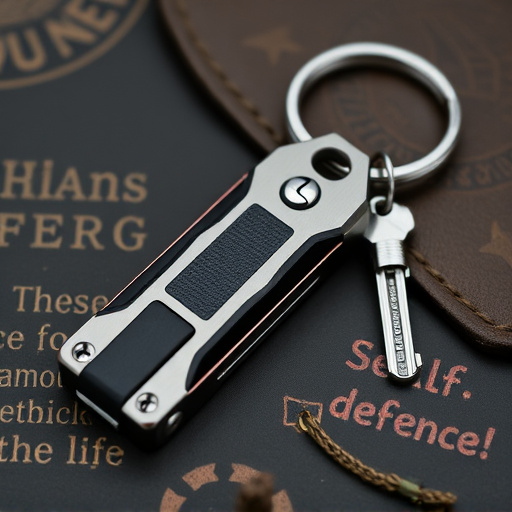Selecting the best alloys for defense keyrings is crucial for performance, durability, and stealth. Top choices include high-quality stainless steel and titanium, offering strength, corrosion resistance, and lightweight designs. These materials cater to diverse needs while ensuring reliable self-defense tools that remain undetectable. When designing, prioritize durable alloys with balanced strength-to-weight ratios for effective and discreet self-defense options.
“Enhance your personal safety with a discreet self-defense keychain—a versatile tool that combines functionality, reliability, and stealth. This article delves into the core considerations for choosing the best alloys, exploring their impact on durability, weight, and corrosion resistance. We examine innovative design elements that ensure your keychain blends seamlessly into daily carry items while still packing a punch. Furthermore, we dissect the integration of defense mechanisms without sacrificing discretion, providing insights from real-life users who rely on these tools.”
- Choosing the Right Alloys for Durability and Stealth
- – Discussion on the importance of durable alloys for a keyring designed for self-defense
- – Comparison of popular alloys (stainless steel, titanium, aluminum) based on strength, weight, and corrosion resistance
Choosing the Right Alloys for Durability and Stealth
When crafting a self-defense keyring, selecting the right alloys is paramount for both durability and stealth. The best alloys for defense keychains should offer exceptional resistance to wear and tear, ensuring the tool remains functional over time. High-quality stainless steel, known for its strength and corrosion resistance, is a popular choice among users seeking a robust yet discreet option. This metal’s versatility allows it to be crafted into various designs, catering to different preferences without compromising on performance.
For those prioritizing ultimate discretion, titanium is an excellent alternative. Lighter than steel but equally durable, titanium keychains boast exceptional strength-to-weight ratio, making them nearly impossible to detect under everyday clothing. Its natural resistance to corrosion further enhances its appeal, guaranteeing longevity without the need for frequent maintenance. Choosing between these alloys ultimately depends on individual needs, with both offering superior performance in terms of durability and stealth.
– Discussion on the importance of durable alloys for a keyring designed for self-defense
When crafting a keyring designed for self-defense, durability is paramount. The keyring should be built to withstand rigorous use and the stresses of unexpected situations. Durable alloys play a crucial role in achieving this. High-quality materials like stainless steel, titanium, or even advanced alloy blends are ideal choices for several reasons. Their resistance to corrosion ensures the keyring maintains its integrity over time, regardless of exposure to moisture or harsh environments.
Furthermore, these durable alloys offer exceptional strength and toughness. They can endure impacts, bends, and strains without deforming or failing, which is essential during critical moments when every component must perform reliably. The best alloys for defense keychains are those that combine high strength with low density, allowing for a compact, lightweight design that doesn’t compromise on durability—a feature that sets apart an effective self-defense tool from a mere accessory.
– Comparison of popular alloys (stainless steel, titanium, aluminum) based on strength, weight, and corrosion resistance
When choosing the best alloys for defense keychains, several factors come into play, primarily strength, weight, and corrosion resistance. Stainless steel stands out for its exceptional durability and ability to withstand harsh conditions, making it a popular choice among those seeking robust self-defense tools. However, its weight can be a drawback, as it adds bulk to your keychain, which might not be ideal for discreet carry.
Titanium offers a compelling alternative with superior strength-to-weight ratio, making it lighter than steel while retaining significant structural integrity. It’s highly resistant to corrosion, ensuring your keychain maintains its edge over time. Aluminum, though less common for such applications due to lower strength, can still be an option for those prioritizing ultra-lightweight designs. Its lightweight nature facilitates discreet carrying, but it may not match the durability of stainless steel or titanium in terms of resistance to wear and tear.
When it comes to self-defense keyrings, choosing the right alloys is paramount. For durability and stealth, stainless steel, titanium, and aluminum each offer unique benefits. Stainless steel excels in strength and corrosion resistance, while titanium provides an excellent weight-to-strength ratio. Aluminum, though lighter, may not be as robust against wear and tear. Consider your needs: if discreetness and longevity are key, titanium or stainless steel are the best alloys for defense keychains.
